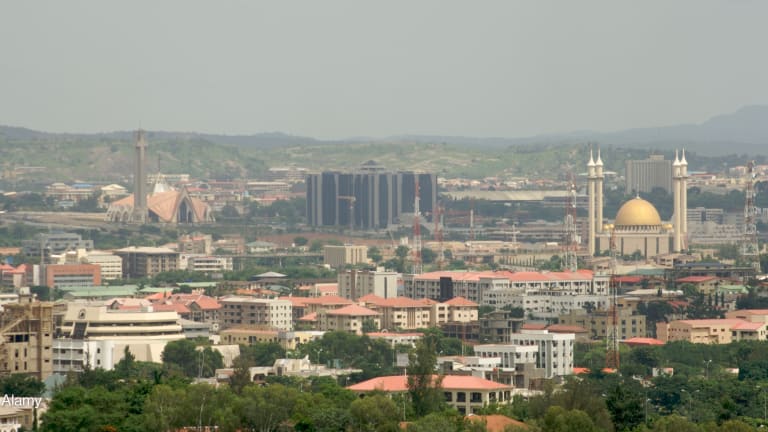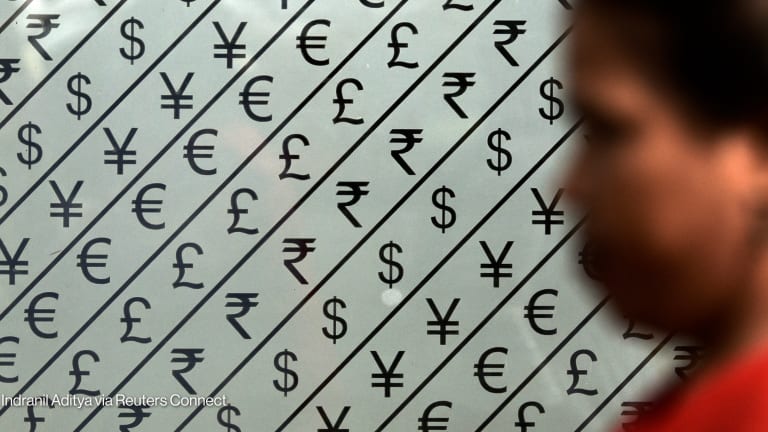World Bank-Nigeria Partnership
The largest donor to Nigeria, the World Bank is helping the country leverage its rich natural resources and strengthen human capital as a way reduce poverty and promote inclusive development.
Village produce market in Nigeria. The country’s agriculture sector has helped grow the economy 6 to 8 percent annually over the past decade. Photo by: Curt Carnemark / World Bank / CC BY-NC-ND Nigeria spent decades under military rule before moving to a democratic system of governance in 1999. Since then, the country has achieved a stable political climate and strengthened its economy considerably. Four elections have been held since Nigeria’s transition to democracy, the latest of which received praise from the international community for being the most successful electoral process in the country’s history both in the fairness of its results and relatively low level of election-related violence. Another is set to take place in 2015. Several steps have also been taken by the government toward building its institutional capacity. The Freedom of Information Act, which entered into force in 2011, reinforced transparency and accountability in public institutions. The utilization of the International Public Sector Accounting Standards at all levels of the government has improved the quality of financial reporting by aligning local practices with international standards. A treasury single account is currently being developed to further strengthen public financial management. Reforms in customs, tax administration and pension administration are likewise underway. On the economic front, gross domestic product has been growing 6 to 8 percent annually over the past decade, owing mainly to Nigeria’s agriculture, trade and telecommunications sectors. Recent years saw a steady flow foreign direct investment to the country, averaging $6 billion to $8 billion annually — one of the highest in Africa. Nigeria is endowed with rich natural resources and has huge potential for economic growth. It is among the top 10 producers of oil in the world, and the largest oil exporter in Africa. Despite these economic achievements, poverty incidence remains high. The country’s agriculture sector is highly susceptible to the effects of climate change, while oil dependence has made the economy vulnerable to price fluctuations and leaves very limited job opportunities for the Nigerian workforce. The World Bank recognizes the crucial role Nigeria plays in the region, as it is home to 47 percent of the West African population. As the top donor to the country, the bank is committed to reducing poverty and promoting inclusive development by helping Nigeria leverage its rich natural resources and strengthening human capital. The World Bank has fully aligned its partnership strategy with Nigeria’s Vision 2020 agenda, and will support the country in reaching these development objectives. Funding levels For the 2014-2017 funding period, the World Bank has allotted $8 billion in development assistance to Nigeria. Below is a breakdown of the bank’s most recent allocations under the International Finance Corp. and the International Development Association, as well as trust fund contributions to the country. Previous assistance was coursed mainly through IFC and IDA. In fiscal 2013, Nigeria was deemed eligible for funding from the International Bank for Reconstruction and Development, and is expected to receive assistance from this financing mechanism starting July 1, 2014. Funding priorities World Bank priorities under this funding period are centered on three main development objectives: - Diversify the economy and catalyze job creation through reforms in the energy sector, increased agricultural competitiveness and greater access to financial services. - Scale up the delivery of social services at the national level to promote social inclusion. - Bolster governance and public sector management while ensuring gender equality and conflict sensitivity. Indira Konjhodzic, task team leader for the country partnership, noted that World Bank efforts for this funding period will focus on building robust capacity for power generation and transmission, as well as strengthening government institutions in managing the energy sector. Increasing agricultural productivity, improving farmer relations with agro-processors, and ensuring gender-inclusive access to finance were also cited as key priorities under this strategy — all of which are geared toward reinforcing the Nigerian economy. Below is a breakdown of World Bank’s recent IDA disbursements by sector. Recently approved projects in Nigeria include: - Power Sector Guarantees Project ($670 million): designed to elevate Nigeria’s energy supply to benefit a larger portion of the population. - Third National Urban Water Sector Reform Project ($273 million): aimed at broadening access to water and strengthening the investment planning capacity of relevant stakeholders. - Second Lagos State Development Policy Operation Program ($200 million): provide public finance management support to the Lagos state government in and create a business-conducive environment. - Community and Social Development Project ($176 million): to increase access to social and natural resource infrastructure services, especially for poor people. - Additional Financing for the Lagos Eko Secondary Education Project ($42.3 million): targets to scale up the quality of public junior and senior secondary education in Lagos state. Devex analysis The World Bank’s IDA contribution to Nigeria is the country’s largest source of official development assistance for 2011-2012, according to the Organization for Economic Cooperation and Development. The current country partnership strategy forms part of the Country Assistance Framework — a mechanism developed by Nigeria’s development partners to coordinate aid delivery and maximize donor resources. World Bank has noted several challenges to the implementation of its projects, including the volatility of oil prices, the upcoming 2015 elections, a propensity for conflict and violence, and conflicting interests between political factions. To mitigate these risks, the bank intends to work closely with CAF partners, which include the U.K. Department for International Development, African Development Bank, European Union, the French Development Agency, International Monetary Fund, Japan International Cooperation Agency, the embassies of China and Brazil in Nigeria, the High Commission of India in Nigeria, the U.S. Agency for International Development, Canada’s Department of Foreign Affairs, Trade and Development, and U.N. agencies. The CAF is instrumental in bringing together Nigeria’s development partners and relevant stakeholders — such as the Nigerian government, the private sector, civil society and media institutions — to discuss their aid strategies for the country. During this funding period, the World Bank will work with CAF partners to continue building the capacity of government institutions and scale up reforms to encourage job creation and socio-economic development, particularly in northern Nigeria, and urbanization. The bank will work in close coordination with DfID on these areas. The World Bank will also work with its partners to support knowledge sharing between state governments across Nigeria, particularly in areas of capacity building, project management, impact assessment, and gathering feedback from project beneficiaries to improve future project design and implementation. To monitor its projects, the bank will partner with civil society organizations, which will conduct third-party monitoring. Contact Tel: (234-703) 583-0641 Email:
Village produce market in Nigeria. The country’s agriculture sector has helped grow the economy 6 to 8 percent annually over the past decade. Photo by: Curt Carnemark / World Bank / CC BY-NC-ND
Nigeria spent decades under military rule before moving to a democratic system of governance in 1999. Since then, the country has achieved a stable political climate and strengthened its economy considerably. Four elections have been held since Nigeria’s transition to democracy, the latest of which received praise from the international community for being the most successful electoral process in the country’s history both in the fairness of its results and relatively low level of election-related violence. Another is set to take place in 2015.
Several steps have also been taken by the government toward building its institutional capacity. The Freedom of Information Act, which entered into force in 2011, reinforced transparency and accountability in public institutions. The utilization of the International Public Sector Accounting Standards at all levels of the government has improved the quality of financial reporting by aligning local practices with international standards. A treasury single account is currently being developed to further strengthen public financial management. Reforms in customs, tax administration and pension administration are likewise underway.
This story is forDevex Promembers
Unlock this story now with a 15-day free trial of Devex Pro.
With a Devex Pro subscription you'll get access to deeper analysis and exclusive insights from our reporters and analysts.
Start my free trialRequest a group subscription Printing articles to share with others is a breach of our terms and conditions and copyright policy. Please use the sharing options on the left side of the article. Devex Pro members may share up to 10 articles per month using the Pro share tool ( ).
As former Devex editor for business insight, Aimee created and managed multimedia content and cutting-edge analysis for executives in international development.








